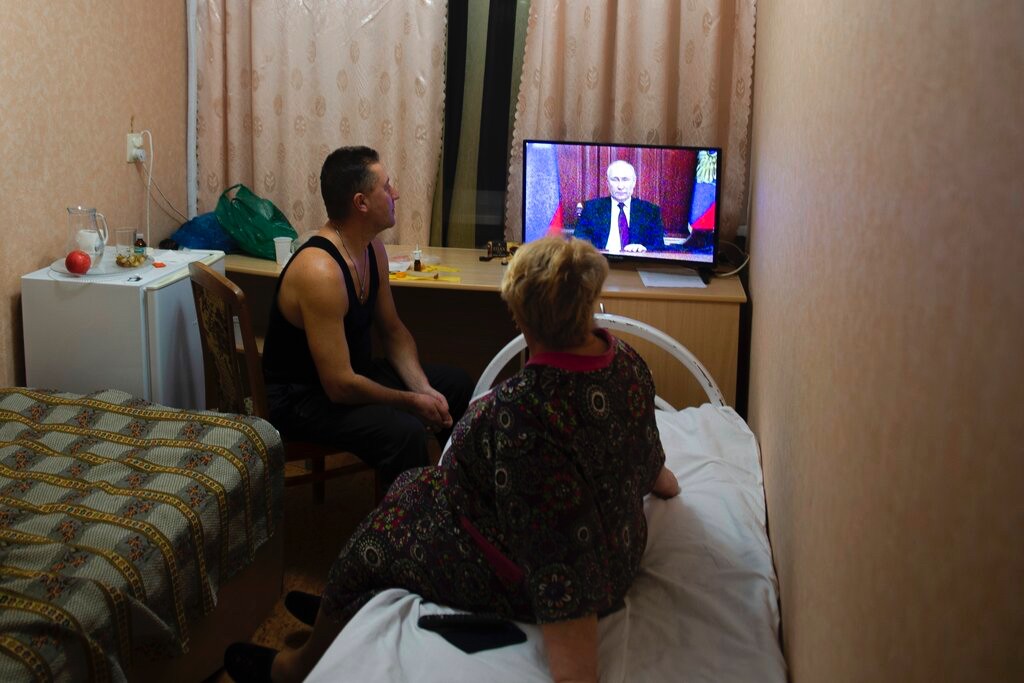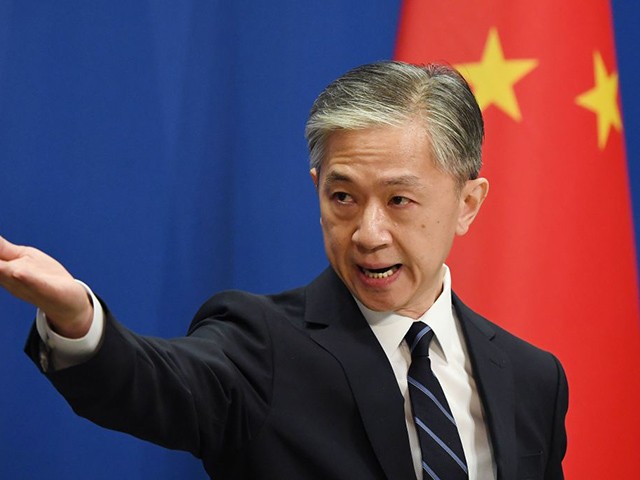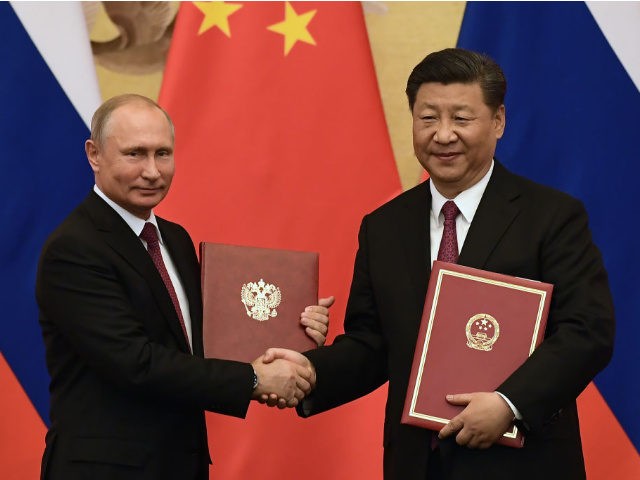Russian leader Vladimir Putin’s decision to recognize the two regions of Ukraine’s Donbas as sovereign states on Monday has complicated Moscow’s relationship with China, which expressed support for Russia while not directly addressing the issue of legitimizing separatists.
Putin announced in a convoluted speech to the Russian public on Monday that he would formally recognize the “Donetsk People’s Republic” and “Luhansk People’s Republic” – Russian proxies that have been openly at war with Ukraine for eight years – as states, which allows Putin to claim that the leaders of those “states” have requested the formal presence of the Russian military. Putin greenlit sending “peacekeeping” forces into the two regions shortly after his speech.
In the speech, Putin claimed that “Ukraine actually never had stable traditions of real statehood” and that Ukraine only exists because of a “mistake” by Vladimir Lenin.

People from the Donetsk and Luhansk regions, the territory controlled by pro-Russia separatist governments in eastern Ukraine, watch Russian President Vladimir Putin’s address at their temporary place in Rostov-on-Don region, Russia, Monday, Feb. 21, 2022. (AP Photo/Denis Kaminev)
Asked directly about China’s stance of separatism generally, Foreign Ministry spokesman Wang Wenbin told reporters on Monday that the Communist Party sought “restraint” and Ukraine and Russia should seek “dialogue and negotiation.”
“China’s position on the Ukraine issue is consistent. The legitimate security concerns of any country should be respected, and the purposes and principles of the U.N. Charter should be jointly upheld,” Wang said. “The situation in Ukraine is getting worse. China once again calls on all parties to exercise restraint, appreciate the importance of implementing the principle of indivisible security, and de-escalate the situation and resolve differences through dialogue and negotiation.”
Wang notably did not mention Donetsk or Luhansk in his first answer, leading to several questions directly asking if Beijing would recognize the Russia-backed separatists in those regions as state governments. The New York Times specifically asked Wang if Russian proxies in Donetsk and Luhansk claiming independence was similar to Taiwan’s existence as a sovereign state for decades, which China denies. According to the Foreign Ministry’s official transcript, Wang refused to answer directly:
Reuters: Does China recognize the Donetsk People’s Republic and the Lugansk People’s Republic as two new independent states?
Wang Wenbin: I just stated China’s position on the Ukraine issue. There is a complex historical context and complicated factors at play on this issue. China’s position on the Ukraine issue is consistent and clear and remains unchanged. China maintains that disputes should be peacefully resolved in accordance with the principles of the UN Charter. We call on relevant parties to exercise restraint, resolve differences through negotiation and avoid further escalation of tension.
[…]
The New York Times: Does China see any parallels between Russia’s assertion that Ukraine is not a separate state and Beijing’s assertion that Taiwan is a part of China?
Wang Wenbin: I just made clear China’s position on the Ukraine issue. Since you mentioned the Taiwan question, I would like to stress that there is but one China, and Taiwan is an inalienable part of China’s territory. This is an indisputable historical and legal fact. The one-China principle is a universally-recognized norm governing international relations. The Chinese people have the strong resolve, determination and capability to safeguard national sovereignty and territorial integrity.
The Chinese government publication Global Times, which often serves as a mouthpiece for the Communist Party, published two commentaries in the past 24 hours apparently addressing the disconnect between China’s desire to support Russia on the international stage and its resistance to legitimizing any separatist movement anywhere in the world. On Monday, former Global Times top editor Hu Xijin, still employed as a commentator, published a video declaring China and Russia inseparable allies.

Chinese Foreign Ministry spokesman Wang Wenbin takes a question during the daily Foreign Ministry briefing in Beijing on July 24, 2020. (Photo by Greg Baker/AFP via Getty Images)
“50 years ago, the U.S. united with China against the Soviet Union, but today, it is impossible for the U.S. to unite anyone of China or Russia against the other,” Hu claimed, referring to the anniversary of former President Richard Nixon’s visit to China. “China and Russia have become firm strategic partners. The situation reflects that the U.S. national policy is more aggressive than that of the Soviet Union back then, and is creating a coalition of forces to oppose it.”
“The Soviet threat was real back then, while today China and Russia have complex and far less hostile relationships with many countries,” Hu asserted.
The next day, Hu’s newspaper published a belligerent article against “secessionism” generally, using the relationship between the sovereign states of Taiwan and Somalia to make its point. While the article did not mention Ukraine, its conclusion – that responsible countries must reject all attempts to carve a state out of another state – has clear implications for Donetsk and Luhansk. The article objected to a visit to Taiwan by members of a political party in Somaliland that seeks a separate state for that region from Somalia.
“The DPP authorities [the government of Taiwan] are not only seeking secession but also fanning the flames to undermine the independence and unification of other countries, harming others without benefiting themselves,” the article quoted a Foreign Ministry official as stating.
The article itself rejected “secessionism ideology” and described Somaliland’s potential secession as “suicide.”
“That’s why we must say NO to secessionists and their absurd actions,” the article concluded.

COMMENTS
Please let us know if you're having issues with commenting.